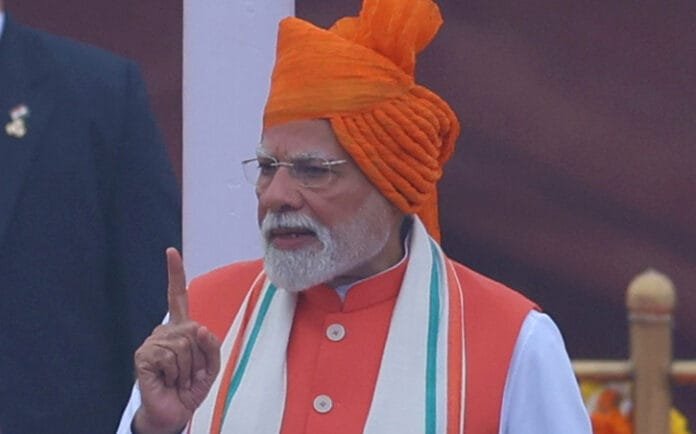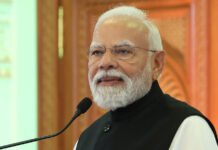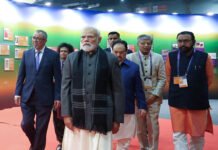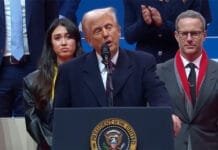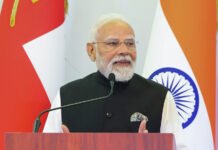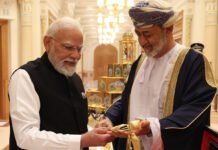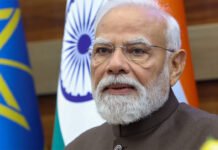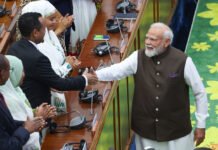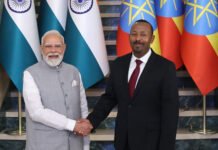On the occasion of India’s 78th Independence Day, Prime Minister Narendra Modi delivered a powerful 103-minute speech from the historic Red Fort, outlining the nation’s progress, unveiling major new initiatives, and sending a strong message to adversaries. His address spanned from national security operations like Operation Sindoor to futuristic defense projects such as Mission Sudarshan Chakra, while reaffirming India’s commitment to becoming a developed nation by 2047.
Operation Sindoor: A Firm Response to Cross-Border Terrorism
Prime Minister Modi began with a strong reference to Operation Sindoor, launched in the wake of the April 22 Pahalgam terror attack that left the nation enraged. Declaring that terrorists and their sponsors are “enemies of humanity”, he revealed that the Indian Armed Forces were given complete operational freedom to execute a decisive strike.
The operation sent a message that India will no longer tolerate nuclear blackmail and will meet any cross-border threat with uncompromising retaliation. The PM underscored that this mission will remain etched in national memory for decades, symbolizing India’s new security doctrine—swift, bold, and unforgiving to those who harm its citizens.
Revisiting the Indus Waters Treaty: Farmers First
Modi called out the “one-sided” Indus Waters Treaty, arguing that it has deprived Indian farmers of their rightful water for decades. Stressing that India’s water belongs to its farmers, he vowed that the current form of the treaty is no longer acceptable. This stance aligns with the government’s broader agriculture-first approach, aimed at ensuring that no drop of Indian water enriches hostile lands while Indian soil remains parched.
Semiconductor Revolution: Made in India Chips by Year-End
Highlighting decades of missed opportunities in technology, PM Modi revealed that India’s semiconductor manufacturing dream, stalled since the 1960s, is finally on track. Six new semiconductor fabrication units have already been established, with the first Made in India chips expected to hit the market by the end of 2025.
This leap is part of a mission-mode strategy to position India as a global hub for electronics manufacturing, reducing dependency on imports and ensuring technological self-reliance.
Mission Green Hydrogen and Nuclear Power Expansion
Addressing India’s energy independence, Modi confirmed thousands of crores in investment into Mission Green Hydrogen, alongside a massive nuclear power expansion plan. Ten new nuclear reactors are already operational, with a vision to increase capacity tenfold by 2047.
Private sector participation in nuclear energy—previously restricted—has now been opened, signaling a paradigm shift in India’s clean energy policy.
Deep Water Exploration Mission: Tapping Oceanic Wealth
The Prime Minister announced the launch of a Deep Water Exploration Mission to locate and harness oil and gas reserves beneath India’s seas. This move is aimed at reducing energy imports, creating high-tech jobs, and strengthening India’s maritime resource capabilities.
National Critical Minerals Mission
Recognizing the strategic value of critical minerals for defense, electronics, and advanced manufacturing, Modi launched the National Critical Minerals Mission. Over 1,200 sites across the country are under exploration, targeting self-reliance in resources vital for cutting-edge technologies and national security.
Achieving Clean Energy Goals Five Years Ahead of Schedule
India had pledged to reach 50% clean energy use by 2030. In a landmark achievement, Modi announced that the target has already been met in 2025, thanks to the nation’s collective resolve and accelerated renewable energy adoption. This milestone is expected to save billions in fuel imports, allowing more funds for rural development, youth empowerment, and poverty alleviation.
Empowering Young Innovators and MSMEs
Calling on India’s youth to “never let their ideas die”, Modi pledged government support for innovators, particularly in manufacturing. He reaffirmed commitment to the National Manufacturing Mission, with a mantra of “more value for less cost” to strengthen MSMEs, which are already recognized globally for their quality tools and products.
Remembering the Emergency: Safeguarding Democracy
On the 50th anniversary of the Emergency, Modi urged every generation to remember the assault on democracy, when constitutional rights were suspended, and the nation was effectively turned into a prison. He called for renewed dedication to the Constitution, ensuring such an event never repeats.
Swadeshi for Strength, Not Compulsion
The PM emphasized that self-reliance in goods and services must come from strength, not compulsion. He encouraged using Swadeshi products to boost the economy, and if necessary, to compel others to adapt to India’s economic strength.
Next-Generation GST Reforms
Announcing major GST reforms, Modi revealed plans to simplify tax systems further. These “next-generation GST reforms” aim to make daily essentials cheaper, boost industrial growth, and stimulate the overall economy—marking the first comprehensive review in eight years.
PM Viksit Bharat Rozgar Yojana: Jobs for the Youth
In a major employment push, Modi launched the PM Viksit Bharat Rozgar Yojana with a ₹1 lakh crore budget. The scheme provides ₹15,000 government support for every private-sector employee in their first job, incentivizing companies to hire more. This initiative is expected to create 3.5 crore new jobs for young Indians.
PM Dhan Dhanya Krishi Yojana: Boosting Backward Districts
To uplift 100 districts lagging in agriculture, Modi introduced the PM Dhan Dhanya Krishi Yojana. The scheme will improve irrigation, crop quality, and farmer incomes in regions left behind in the Green Revolution.
National Demography Mission: Securing Borders and Society
Sounding a warning about deliberate demographic changes in border areas, Modi announced a High-Powered Demography Mission to monitor and address illegal infiltration. He accused infiltrators of seizing land, threatening livelihoods, and targeting women, declaring that India will not allow demographic manipulation to endanger national security.
RSS Centenary: Honoring a Century of Service
Marking 100 years of the Rashtriya Swayamsevak Sangh (RSS), Modi hailed it as the world’s largest NGO, dedicated to nation-building through character development.
Mission Sudarshan Chakra: A Decade-Long National Security Shield
In one of the most significant announcements, Modi unveiled Mission Sudarshan Chakra—a powerful weapon system capable of neutralizing enemy attacks and delivering swift counterstrikes. By 2035, all critical civilian and strategic sites, including hospitals, railways, and places of worship, will be integrated into a comprehensive national security shield.
Combating Obesity: A Health Call to Families
Highlighting rising obesity rates in India, Modi urged households to reduce cooking oil consumption by 10%. He framed this as a collective fight for a healthier nation, calling obesity a silent but serious public health challenge.
Cultural Diversity and Language Preservation
Celebrating India’s linguistic richness, Modi granted classical language status to Marathi, Assamese, Bengali, Pali, and Prakrit. Through the Gyaan Bharatam initiative, ancient manuscripts and handwritten texts are being digitally preserved, ensuring heritage and knowledge remain accessible for future generations.
A Vision for a Developed, Self-Reliant India
Concluding his address, PM Modi stressed that self-reliance is not limited to trade and currency but is tied directly to national strength. He called on citizens to extend their own “lines” rather than diminish others’, symbolizing constructive competition and resilience in a world driven by economic self-interest.
In essence, the 103-minute address was a blueprint for India’s next chapter—militarily assertive, technologically ambitious, economically self-reliant, and socially united. From Operation Sindoor’s decisive blow to terrorism to Mission Sudarshan Chakra’s futuristic defense shield, the message was clear: India is prepared, determined, and destined to rise as a global leader.

